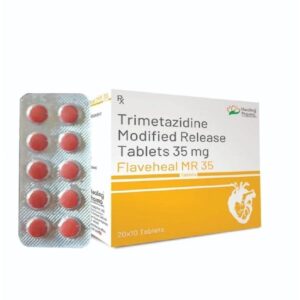TRIMETAZIDINE + HYDROCHLORIDE
Trimetazidine: Trimetazidine is a medication that is primarily used to treat certain heart conditions, such as angina. It is usually prescribed as an adjunct to other angina treatments, such as beta-blockers or nitrates.
The exact mechanism of action of trimetazidine is not fully understood. However, it is believed to work by improving the efficiency of cardiac metabolism. It helps the heart cells to better utilize oxygen and glucose, which in turn enhances the production of energy and improves the overall function of the heart.
The typical dose of trimetazidine is 20 mg three times a day. However, the dosage may vary depending on the individual and their specific condition. It is important to follow the prescribed dosage and duration of treatment recommended by the healthcare provider.
Trimetazidine is generally well-tolerated, but like any medication, it can have side effects. Common side effects include dizziness, headache, nausea, vomiting, diarrhea, and stomach pain. These side effects are usually mild and temporary.
In rare cases, trimetazidine may cause more serious side effects such as allergic reactions, muscle weakness, and abnormal heart rhythm. If any of these severe side effects occur, immediate medical attention should be sought.
Trimetazidine should be used with caution in patients with severe kidney or liver impairment, as the dose may need to be adjusted. It is not recommended for use in pregnant or breastfeeding women unless specifically prescribed by a healthcare professional.
As with any medication, it is important to discuss with a healthcare provider about the potential benefits and risks of using trimetazidine, as well as any other concerns or medical conditions before starting the treatment.
Hydrochloride: Hydrochloride is not a specific drug, but a common salt form of many medications. However, I can provide information on a commonly prescribed medication called Hydroxyzine Hydrochloride, which is also known by the brand names Atarax and Vistaril.
Hydroxyzine Hydrochloride is an antihistamine that is mainly used for the treatment of allergies and anxiety. It can also be used as a sedative to help relax and calm patients before surgery or medical procedures. Additionally, it has some anti-itch and anti-nausea properties.
The exact mechanism of action of Hydroxyzine Hydrochloride is not completely understood, but it is known to block the action of histamine, a substance in the body that plays a role in allergic reactions. By inhibiting histamine, Hydroxyzine Hydrochloride helps to alleviate symptoms such as sneezing, runny nose, itching, and hives, associated with allergies.
The dosage of Hydroxyzine Hydrochloride may vary depending on the condition being treated and the age and weight of the patient. For adults, the typical dose for allergies is 25 mg to 50 mg taken three to four times a day. For anxiety, the usual dose is 50 mg to 100 mg taken three to four times daily. However, it is essential to follow the specific instructions provided by your healthcare provider.
Common side effects of Hydroxyzine Hydrochloride include drowsiness, dizziness, blurred vision, dry mouth, and constipation. These side effects are usually mild and transient, but if they become severe or persistent, it is recommended to consult a doctor. Hydroxyzine Hydrochloride can also cause more serious side effects such as irregular heartbeat, confusion, seizures, or allergic reactions, although these are rare.
It is important to note that the information provided is a general overview of Hydroxyzine Hydrochloride, and you should always consult your healthcare provider for specific instructions and advice regarding its use.

